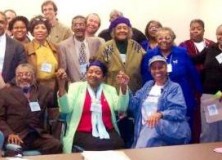The track-record of the SCRC over our first 15 years in creating and securing resources for projects is stellar. The original thinking in the formation of the Center—to assist progressive community initiatives with funding and scientific expertise—has proven correct. We have worked with hundreds of community-based organizations, conducted dozens of projects that have positively affected the lives of thousands of people. 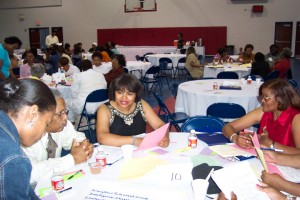 We believe that working people can take control of their lives and their futures if they can secure the resources and information to act in a coordinated manner. The description of previous projects below demonstrates this perspective. In all of these projects, the SCRC secured funding for the overall project. The majority of funding was allocated to the community partners and determined by their decisions. Clearly, the community/SCRC partnerships are but a small element in the larger struggles for decent and rewarding lives…but we believe they have played an important part.
We believe that working people can take control of their lives and their futures if they can secure the resources and information to act in a coordinated manner. The description of previous projects below demonstrates this perspective. In all of these projects, the SCRC secured funding for the overall project. The majority of funding was allocated to the community partners and determined by their decisions. Clearly, the community/SCRC partnerships are but a small element in the larger struggles for decent and rewarding lives…but we believe they have played an important part.
A representative sampling of our previous projects follows:
Communities of Color and Bioethics: Expanding the Debate. In 1997, then President Clinton issued a formal apology on behave of the United States government for its immoral actions in conducting the horrific “Tuskegee Study of Untreated Syphilis in the Negro Male” (not to be confused with the Tuskegee Experiment). Connected to this apology was the commitment to fund a research center at Tuskegee University that would address the unique historical exploitation and mistreatment of African-Americans by the US research community—the center would become the Tuskegee University National Center for Bioethics in Research and Health Care. In 2001, the SCRC was asked to design and conduct an investigation into the views and beliefs African American communities in the Alabama Blackbelt regarding health and medical research. The investigation also explored the reasons for their resistance to participating in such studies and what steps the research sector could take to improve the ethics of studies involving African Americans. The investigation consisted of a series of Dialogue Sessions employing CBPR and popular education tools. From the dozens of sessions that were convened, Communities of Color and Bioethics drafted a set of principles to address the special concerns of African Americans and made recommendations for a pathway to construct ethical guidelines which more fully related to their history and culture.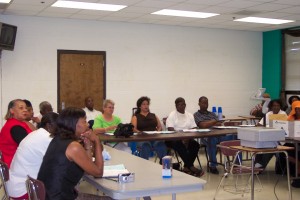
Tools for Change: Building the Participatory Road to a Healthy Georgia. Health outcomes for minorities (and in all populations) are most severe in the deep south. Tools for Change was a statewide network of HBCUs (Historically Black Colleges and Universities), in partnership with community-based organizations in five rural communities in Georgia, that employed CBPR and other participatory methods to eliminate health disparities. The primary goal of eliminating health disparities was married to the SCRC’s effort to strengthen the role of HBCUs in this campaign. We believed that HBCUs should take the lead in the campaign. The campaign led to a subsequent project: New Tools/New Visions, which expanded and deepened the scope of the original initiative.
Community-Based Participatory Research and Social Justice: Linking Science & the Movement for Social and Economic Justice in the Southeast. The SCRC convened meetings with community-based groups and people’s organizations in six southeastern states to discuss the struggle for social and economic justice and what role scientific and technical research and tools might play in advancing that struggle. Groups representing the civil rights movement, public education equity, labor, migrant workers, and the LGBT movement met to devise a strategy that would more fully utilize the resources from scientific and technical institutions in the larger struggle. 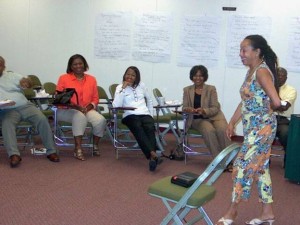 The framework for these dialogues was the principles authored by the SCRC. Projects and initiatives arising from this project are underway and are establishing new linkages and tactical actions.
The framework for these dialogues was the principles authored by the SCRC. Projects and initiatives arising from this project are underway and are establishing new linkages and tactical actions.
School-Based Health Care Public Policy: Launched in 2004, the W.K. Kellogg Foundation’s School-Based Health Care Policy Program (SBHCPP) was created to help expand and stabilize the school-based health care model. Specifically stated, the program goal is “to promote the health of children, adolescents, and their families by developing their capacity to mobilize and engage communities – especially youth – to inform the quality, delivery, and financing policies of health care in school-based health centers and to explore models that financially secure the future of school-based health centers.” The SBHCPP included nine state-wide SBHC networks within this national initiative. The SCRC collaborated on this project to provide a conceptual framework and community-based approaches to building a social movement for better healthcare for low income children. We conducted workshops around the U.S. in participatory approaches to making public policy, i.e., how policy making can become more democratic and led by community members.
Jackson Roadmap to Health Equity. The Jackson Roadmap grew out of the search for a way to address health disparities in a holistic and comprehensive manner in Jackson and across the state of Mississippi. The project focused on the Social Determinants of Health as the causes of disparities in health within the African American community in particular, and low income residents more generally, and employed a variety of methodological approaches, which included concept mapping, dialogue sessions, and CBPR. 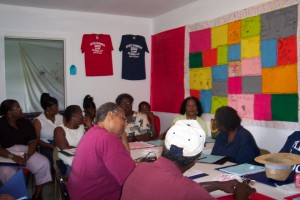 Community-based organizations, educational institutions, labor unions, and health services collaborated to form a city-wide, community member led council that directed the Jackson Roadmap through two additional phases of the project work.
Community-based organizations, educational institutions, labor unions, and health services collaborated to form a city-wide, community member led council that directed the Jackson Roadmap through two additional phases of the project work.
Health Disparities Toolkit: Community Participation, Social Determinants of Health, and Popular Education. Through our many collaborations with community groups and organization, universities—particularly, HBCUs—labor organizations, schools, and faith-based entities, the SCRC developed a deep and broad understanding of the meaning of health disparities, the impact of the social determinants of health, and the structural barriers to improving the lives of working people, in particular, people of color. We brought these experiences together with our knowledge and experiences in participatory methods to create the Health Disparities Toolkit. This set of methods, workshops, and analytic approaches is now one of our key resources we bring to current and future projects.
Photo-voice project in Pakistan: Empowering Adolescents to Speak About their Lives. 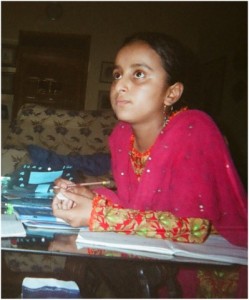 The SCRC is committed to actively seeking ways to assist and, where possible, help fund new and innovative ways for communities and researchers to implement participatory processes. In keeping with that commitment, the SCRC helped fund an international project in Pakistan that utilized an innovative participatory approach to empowering the local population. In a photo-voice, or photo-elicitation project, research participants are given cameras to document their environments and experiences in order to provide them with their own visual referent as a starting point for conversations about their perceptions. The investigators conducted extensive research that helped Pakistani children develop a deeper understanding of systems of oppression as normalizing inequity in which rich people are happy with their education, jobs, and big houses, while poor people lack the basics such as education, jobs, and medicines.
The SCRC is committed to actively seeking ways to assist and, where possible, help fund new and innovative ways for communities and researchers to implement participatory processes. In keeping with that commitment, the SCRC helped fund an international project in Pakistan that utilized an innovative participatory approach to empowering the local population. In a photo-voice, or photo-elicitation project, research participants are given cameras to document their environments and experiences in order to provide them with their own visual referent as a starting point for conversations about their perceptions. The investigators conducted extensive research that helped Pakistani children develop a deeper understanding of systems of oppression as normalizing inequity in which rich people are happy with their education, jobs, and big houses, while poor people lack the basics such as education, jobs, and medicines.
Renewable Energy Training, Economic and Electrification Development Program (RETEED). RETEED addressed a group of developmental challenges which arose in South Africa since the end of apartheid. Specifically, in collaboration with Wilberforce College and the government of South African, the SCRC worked to: (1) introduce proven renewable energy systems to three selected urban and farming communities in South Africa, Zambia and Ghana, 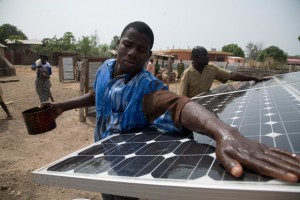 (2) train a cadre of renewable energy technicians, (3) produce one or more value added renewable energy base product(s), (4) identify new financing systems so that energy sources from renewal sources are affordable to more users, and, (5) develop participatory mechanisms to more effectively engage communities in the decision making process for energy and other public services delivery. Funded through the Government of South Africa.
(2) train a cadre of renewable energy technicians, (3) produce one or more value added renewable energy base product(s), (4) identify new financing systems so that energy sources from renewal sources are affordable to more users, and, (5) develop participatory mechanisms to more effectively engage communities in the decision making process for energy and other public services delivery. Funded through the Government of South Africa.

